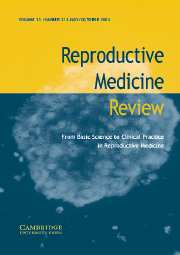HUMAN PREGNANCY: THE ROLE OF CHEMOKINE NETWORKS AT THE FETAL–MATERNAL INTERFACE
Published online by Cambridge University Press: 25 January 2005
Extract
To prepare for the presence of a fetus, the uterus undergoes a critical process termed decidualisation that, in mice and probably humans, is required for reproductive success. This process involves phenotypic changes in uterine stromal cells that enable them to support implantation and placental development. Accompanying this transformation is the recruitment of a specialised population of maternal immune cells. These cells, termed decidual leukocytes, are a significant presence, composing up to 70% of cells in the uterus throughout early pregnancy. At first glance, the recruitment of immune cells to the site of implantation seems at odds with maternal tolerance. However, the unique characteristics of decidual leukocytes, particularly with regard to their abundance and distinct composition, suggest that they participate in protecting fetal tissues from immune attack. Thus, the mechanisms that recruit decidual leukocytes to the uterine wall provide an important component to successful pregnancy.
- Type
- Research Article
- Information
- Copyright
- © 2004 Cambridge University Press
Footnotes
- 2
- Cited by




